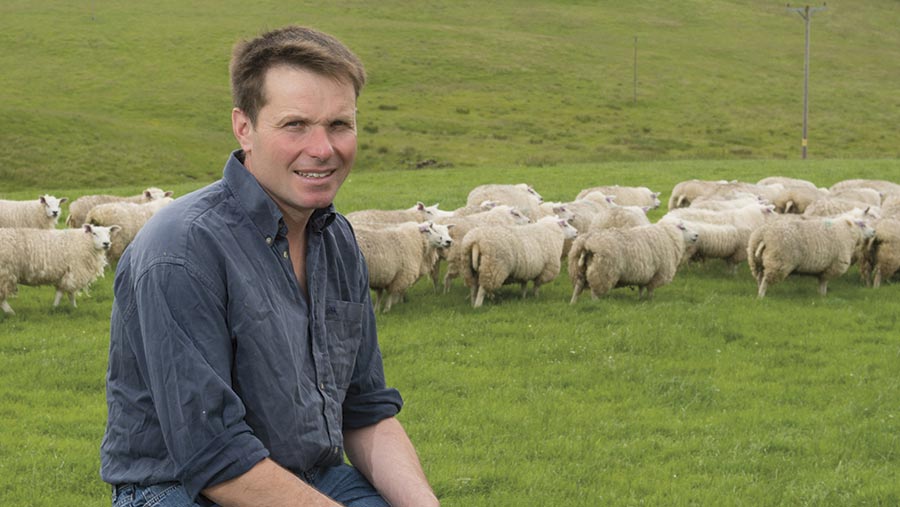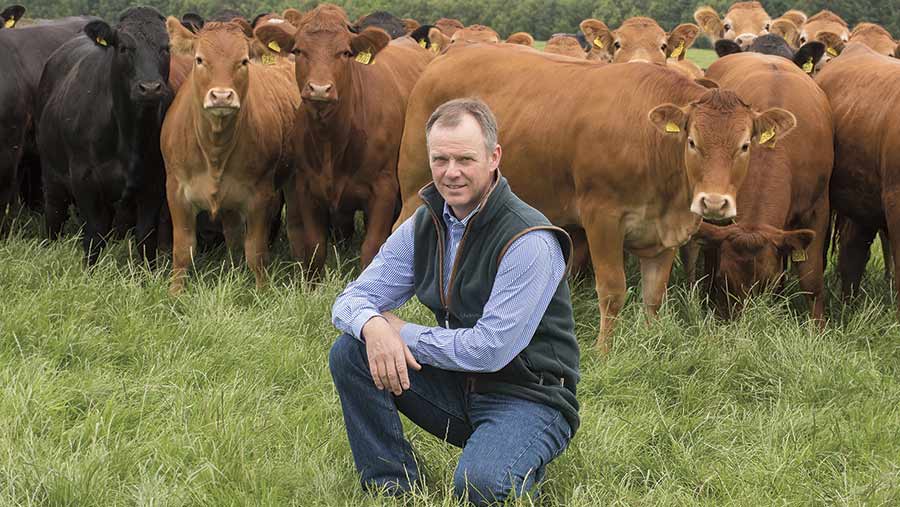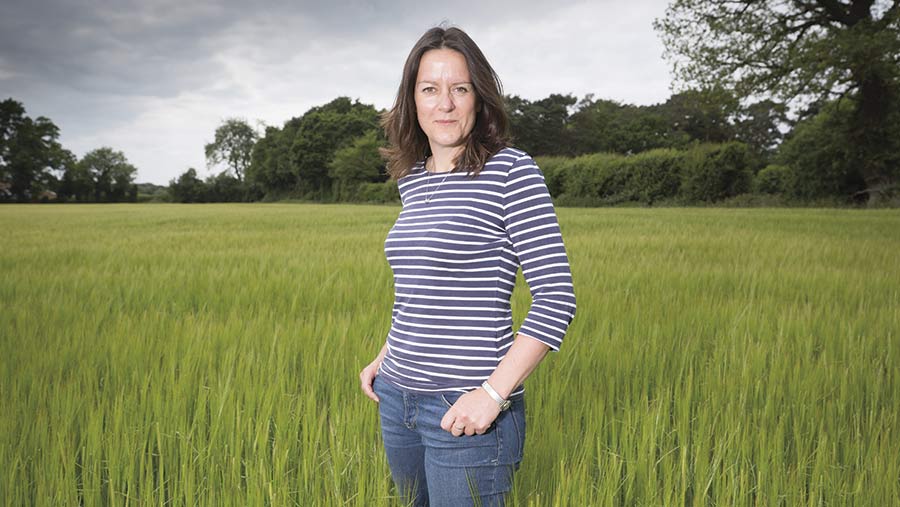2017 FW Awards: Mixed Farmer of the Year finalists
The Farmers Weekly Awards 2017 finalists have been announced and the judges have visited each of the finalists for a three-hour interview and tour.
While the Mixed Farmer of the Year category encompasses a wide variety of farming systems, each of the finalists has much in common. They are hard-working, business-savvy and have a strong understanding of how to deliver what their customer wants.
See also: All the latest Farmers Weekly Awards news
The 2017 Mixed Farmer of the Year finalists are:
- Neil McGowan, Incheoch Farm, Alyth, Blairgowrie
- Robert Neill, Upper Nisbet Farm, Jedburgh, Roxburghshire
- Emily Norton, Nortons Dairy, Frettenham, Norwich, Norfolk
The judges are:
- Caroline Drummond, independent judge
- Andrew Meredith, Farmers Weekly
- Robert Davies, last year’s winner
Neil McGowan, Incheoch Farm, Alyth, Blairgowrie

Neil McGowan ©Angus Findlay
Nestled within sight of the southern reaches of Cairngorms National Park, Incheoch Farm is described by Neil as a “farm on the edge,” with wilder, less productive land further up the valley, and land of top horticultural quality downhill.
Far from bemoaning the fact that he isn’t on the valley floor, however, he has grasped the opportunity to raise his family in a beautiful environment while producing cattle and sheep that aim to outlast and outperform the competition.
Farm facts
- The McGowans expect to reach the landmark of 1,000 rams sold on farm at their 11th ram sale in 2018
- 40 lambs are sold direct to consumers each year and two cattle per fortnight are sold through a local independent butcher
- The farm had 1,168mm of rainfall in 2016, up from 762mm in 1996
The family were early adopters of the Luing breed, and still market breeding heifers and bulls alongside a Simmental herd.
Lleyn and Texel rams are bred from a high health status flock of 1,200 ewes, with a scientific focus on selecting for desirable traits, while still retaining the shape and style that customers demand.
Creating opportunities
The resulting top-quality rams are then sold at the on-farm auction – the culmination of the year’s work – with approaching 100 Texel and Lleyn rams set to go under the hammer again this September.
The opportunity to sell sheep with a higher biosecurity status, show off the land on which the animals were raised, and bring the community together for a beer and a barbecue were all inspirations for establishing the event, set to enter its 10th year this season.
Fat lamb production has also had costs trimmed by a focus on more production from grass, with lambs now finishing on high-powered red clover leys grown as part of a productive rotation that includes malting barley, wholecrop and swedes.
Neil is also proud of the 500ha farm’s environmental status, and credits his wife Debbie with strong support in both the day-to-day running of the sheep enterprise and negotiating the jungle of paperwork that has seen them continuous members of stewardship schemes since 2004.
Securing the future
Not content to rest on his reputation, Neil has recently concluded the speaking tour that completed his Nuffield scholarship, which turned his breeding philosophy on its head to focus on removing inefficiency rather than breeding for efficiency.
In spite of benefitting from increasing subsidy payments in recent years, the business has also managed to drive down the proportion of income from subsidy from 20% to 14%.
Government cash is being diverted into infrastructure improvement, such as drainage and fencing, in an attempt to get in as good as shape as possible for any Brexit headwinds.
The judges liked
- Neil is happy to share ideas, keen to have his mind changed, and has a hunger for more information
- A clear focus on increasing efficiency and breeding livestock fit for the future should help bolster the security of the business
- Environmental work has increased the wildlife habitat area and seen brown hare numbers rise
Robert Neill, Upper Nisbet Farm, Jedburgh, Roxburghshire

Robert Neil ©Angus Findlay
Family man Robert is the driving force behind the expanding business at Upper Nisbet, in the Scottish Borders, where, through hard work and a willingness to continually embrace developments in best practice, he and his wife, Jacqueline, have doubled the size of their tenanted farm in 17 years.
He credits his father with instilling in him and his two brothers the ambition and work ethic that has driven them each to run a farm of their own.
Farm facts
- Spring block calving herd with calves managed on different rations to deliver year-round sales
- Piped water supply to every field with watercourses fenced off to prevent livestock access
- 3,000t grain store erected in 2011 with batch dryer and weighbridge to improve crop management and allow grain to be marketed throughout the year
Although the three brothers now farm independently, they still collaborate strongly to the benefit of each of their businesses. Robert also sees outreach to the supply chain and the consumer as pivotal to successful farming.
“Every day is an open day at Upper Nisbet,” he says, explaining that they regularly host visits from discussion groups, school children, and have also welcomed butchers and chefs to sell the story of the quality of their arable and beef farm.
Creating opportunities
“Grass is my break crop,” Robert says, explaining that 40ha per year of medium-term grass leys are planted on the farm each year alongside an arable rotation that comprises winter barley, winter wheat and spring barley grown for cattle feed or seed contracts.
Cattle are generously bedded up with the resulting straw, and the farmyard manure is vital for maintaining the structure and fertility of the light, free-draining land, says Robert.
While the best bull calves are kept back to sell as bulls, the majority of cattle are marketed through the fat ring at St Boswells, with Robert aiming to sell there 52 weeks per year to provide consistent supply to the strong contingent of independent butchers in the area.
The farm benefits from being in an area low in both weeds and diseases, with a £20/t premium on cereals for seed production, and the herd enjoying a level 3 accreditation against Johne’s disease, as well as being mercifully TB-free.
Securing the future
Robert’s primary goal is to set the business up to be able to give both his sons the opportunity to farm and he is chasing further efficiencies from both the cattle and cropping enterprises to do so.
This is being achieved by continual performance monitoring of the finishing cattle and by reducing waste in the arable system by taking advantage of the increased cropping area to justify precision farming technology such as variable rate fertiliser applications.
The judges liked
- Sharing machinery with the other family businesses had driven down arable and grass harvesting costs and helped with labour demand at peak times
- Awareness of environmental issues including cutting carbon footprint by 19% which saved the business £19,000 annually
- Passion for recording every aspect of the business to evaluate performance and chase further efficiencies
Emily Norton, Nortons Dairy, Frettenham, Norwich, Norfolk

Emily Norton ©Tim Scrivener
When you visit Church Farm, 30 minutes north of Norwich city centre, it’s easy to see why Emily describes a lengthy crop rotation as “the bedrock of a resilient farming system”.
Farm facts
- Collaboration with neighbours through sharing of equipment and selling bull calfs
- Average field size under 10ha – meaning farm benefits from more than 15km of hedgerows
- This year marks the 70th anniversary of the farm being under Norton ownership
A relatively modest 160ha by today’s expansive standards, the farm nevertheless has sugar beet, malting barley, wheat, maize, energy crops and rotational grass flourishing thanks to a traditional grass-cereal-root rotation with a high-tech dairy operation at its heart.
The light, sandy arable land is kept fertile by 25t/ha of slurry and farmyard manure generated by the 55 robot-milked Brown Swiss cows and followers that were the key to Emily returning to the farm in 2007.
After completing her Masters in sustainable agriculture from Harper Adams University, she wanted to return to the home farm, but with five family members already in position she realised the only way was to add another enterprise, and settled on dairy processing.
Creating opportunities
Celebrating it’s 10th year this year, Nortons Dairy offers milk deliveries to local homes and also manufactures butter and award-winning cheese and yoghurt.
Now there are eight part-time members of staff working in the dairy to convert up to 4,000l of milk per week to keep up with demand from a variety of regional shops and farmers’ markets.
Not content with only reaching out to the public directly with goods and services, Emily is continuing the farm’s 35-year reputation for hosting visits from schools and other interested parties.
“The robot is a great virtual story,” Emily explains, as it allows children to seamlessly see the journey of milk from the cow, through the pipeline, culminating on the table.
This has tied in with her outreach work beyond the farmgate, which, among other things, has involved supporting events such as BBC Countryfile Live, organisations such as Ladies in Beef, and setting up #Febudairy, her riposte to the high-profile #Veganuary campaign.
Securing the future
Succession planning is at the heart of this cohesive family unit, which meets for a formal business discussion every second Friday. Emily says continuing to grow the business to allow the return of another family member, while reducing reliance on subsidies is vital.
Currently in discussion to sell the dairy products into a nationwide supermarket, she is targeting growing the dairy herd as the key to ensure a steady supply, saying “I want milk supply to be a problem.”
The judges liked
- Cows still go out to graze in spite of being robot milked – well-managed 8-hour paddocks around the shed
- Strong environmental credentials by participation in environmental schemes since they were launched
- Continual personal development – followed up university education with a Worshipful Company of Farmers Challenge of Rural Leadership course
Sponsors message:
![]() Bridgestone are delighted to sponsor the Mixed Farmer of the Year category. We recognise the enormous challenge mixed farmers face in developing a broad range of technical skills.
Bridgestone are delighted to sponsor the Mixed Farmer of the Year category. We recognise the enormous challenge mixed farmers face in developing a broad range of technical skills.
The three finalists stand as excellent role models, demonstrating how a can-do attitude will reward those seeking to build resilience into their business.

